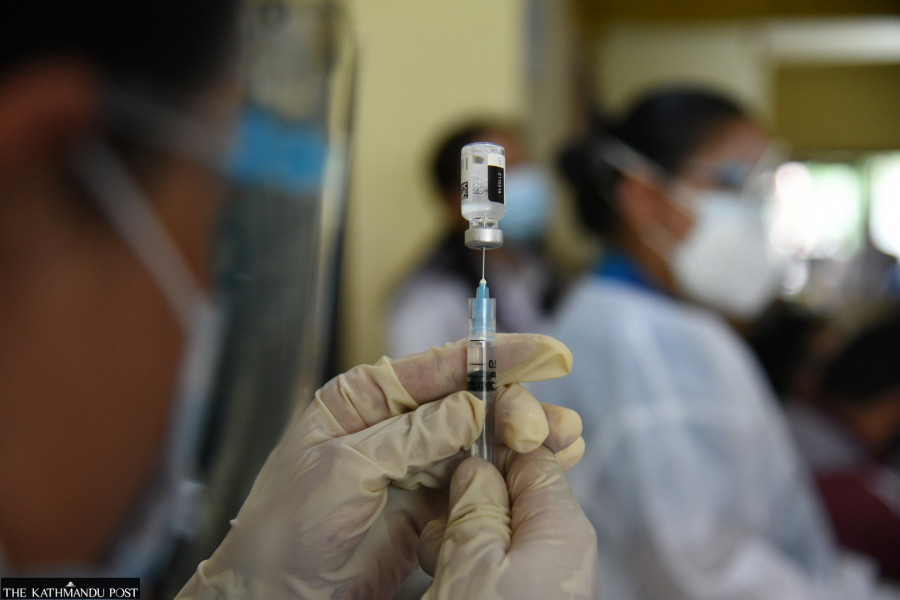Health
1.5 million Pfizer’s Covid doses arrive
Health facilities may jab everyone of above 12 years once people of priority groups take additional booster shots.
Arjun Poudel
Nepal on Wednesday received 350,000 doses of Pfizer-BioNTech’s bivalent Covid vaccine from the COVAX facility.
This is the last consignment of additional 1.5 million doses of bivalent Covid vaccine supplied by the United Nations-backed international vaccine-sharing scheme.
“We received 350,000 doses of the vaccine today [Wednesday],” said Dr Surendra Chaurasia, director of the Logistic Management Section at the Family Welfare Division under the Department of Health Services. “With this consignment, we received all 1.5 million doses of the vaccine.”
Earlier in February, the facility had supplied 1.5 million doses of the vaccine, which were administered to people of certain groups— people above 55 years old, pregnant women, health workers, people with weak immunity and those suffering from chronic diseases.
Officials said all three million doses of Pfizer-BioNTech’s bivalent Covid vaccine are part of the 9.2 million doses committed by the facility to supply to Nepal in the past.
Pfizer-BioNTech is the only bivalent jab that has got emergency use approval from the drug advisory committee in Nepal.
The bivalent Covid vaccine includes a component of the original virus strain, as well as a part of the Omicron variant to provide broad protection against Covid.
The vaccine is called a bivalent Covid shot, as it contains two components—the original virus strain and Omicron BA.4 and BA.5 sub-variants. Doctors say a bivalent Covid vaccine may also be referred to as an ‘updated’ Covid vaccine booster dose.
Health ministry officials said that vaccine doses are being supplied to health facilities per the demand. They say that health facilities could administer doses to all people above 12 years once the priority groups take additional booster shots.
“They [districts and provincial health agencies] are free to make their own decisions regarding whom to administer the second boosters,” said Dr Abhiyan Gautam, chief of the Immunisation Section at the Family Welfare Division of the Department of Health Services. “But health facilities concerned need to ensure that elderly people and others of priority groups should be immunised first.”
Officials said Covax has promised to provide more doses, but Nepal will place demands based on actual demand at home.
Of late, Nepal has been witnessing a slight surge in new coronavirus cases. Infectious disease experts said that the ongoing rise in Covid cases is a clear sign that a new variant of the coronavirus is penetrating communities.
A lot of people are currently suffering from flu and fever, which could be Covid-flu according to doctors.
“People are suffering not only from the common cold but also with fever,” said Dr Prabhat Adhikari, an infectious disease and critical care expert. “We have stopped undergoing testing, but we cannot deny the fact that a new variant or sub-variant of the virus could be responsible for the ongoing surge.”
Nepal on Wednesday recorded 34 new Covid cases. The Health Ministry says it is the cumulative total of the last six days. The number was 24 on Tuesday. On Monday, the figure was 69—twenty-five in 488 polymerase chain reaction tests and 44 in 778 antigen tests.
Officials say that the majority of the people testing positive for the coronavirus, of late, are those who returned home from India.
Lately, India has been reporting a sharp rise in coronavirus cases. The country on Wednesday recorded seven deaths and 2,151 fresh coronavirus infections, according to media reports.
Several states and territories of India, including Delhi, Maharashtra, Gujarat, Tamil Nadu, Uttar Pradesh, Bihar, West Bengal, Uttarakhand and Telangana saw a surge in new cases. Uttar Pradesh, Bihar, West Bengal and Uttarakhand border Nepal.
Scientists in India say that a new sub-variant of Covid, XBB.1.16, is responsible for the recent surge in cases.
Experts say the rise in new cases of the coronavirus in Nepal comes as no surprise after the rise in new cases in India and given the uninterrupted cross-border movement.
Thousands of people from both countries enter each other’s territories every day on top of the large number of those who use unregulated points along the porous borders to cross over to the other side.
Health Ministry officials said that they have already alerted the agencies concerned of the risks, asking them to step up surveillance.
Doctors warn that even if the new virus variant does not severely impact the young population, the elderly and those with weak immunity are at high risk. The rise in infections also increases the severity and hospitalisation rate, the doctors added.
Nepal so far has used Covid vaccines developed by the University of Oxford and the pharmaceutical giant AstraZeneca, manufactured in various countries of Europe, India and Japan, the Chinese Vero Cell, and the US-made Janssen, Moderna, and Pfizer-BioNTech.
So far, 12,020 Covid-related deaths have been reported in Nepal, according to the official count.




 11.84°C Kathmandu
11.84°C Kathmandu















